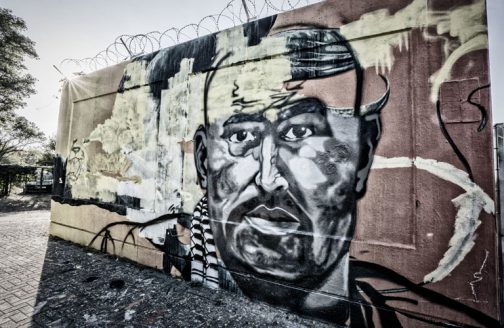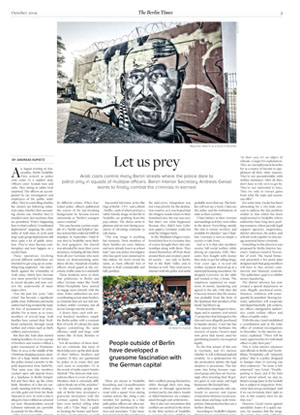Arab clans control many Berlin streets where the police dare to patrol only in squads of multiple officers.

An August evening on Sonnenallee, Berlin-Neukölln: Tires screech as police vans come to a sudden stop. Officers enter hookah bars and cafes. Men sitting at tables look surprised. The officers are accompanied by tax investigators and employees of the public order office. They’re controlling whether bar owners are following industrial codes, whether their accounting checks out, whether they’ve installed more slot machines than are permitted. What’s happening here is what’s called a “coordinated deployment” targeting the criminality of Arab clans. In 2018, such large-scale group deployments still drew quite a lot of public attention. They’ve since become commonplace and now happen on a weekly basis.
These operations involving several different authorities are intended to get a leg up on something long neglected – the state’s battle against the criminality of Arab clans, which have become ever more powerful in Germany in recent decades and now control the underworld of many major cities.
Over the past few years, “clan crime” has become a significant public issue. Politicians and media outlets had long avoided the topic for fear of accusations of xenophobia. For as many as 20 years, members of several large Arab families have earned their livelihood exclusively through social welfare and crimes such as theft, robbery and extortion.
But then the Arab clans started making headlines. In 2010, a group of brothers and cousins robbed a poker tournament at Potsdamer Platz. In 2014, in the middle of the Christmas shopping season, members of a large family known to the police looted a jeweler in the posh department store KaDeWe. That same year, clan members cracked open safe-deposit boxes at a Sparkasse in Berlin-Tempelhof and then blew up the entire bank. Members of a clan are currently standing trial for stealing a 100-kilo gold coin from the Bode Museum in 2017. In 2018, a clan is alleged to have robbed an armored car near Alexanderplatz; several Lebanese nationals are currently in custody for the offense. “
The increased public interest was driven by the criminals’ own insolence,” argues Ralph Ghadban, a Lebanese-born Islamic scholar living in Berlin. “Their arrogance reached such a degree that no one could overlook it. Last year, Ghadban published a bestseller titled Arabische Clans – Die unterschätzte Gefahr (Arab clans – the underrated danger). “If the media covers it,” he says, “it influences policy. Politics reacts, but it’s not proactive.”
The funeral of a felon also attracted attention last year. Nidal R. had spent 14 of 38 years in prison. By his 20th birthday, the police had prosecuted him for 80 different crimes. When frustrated police officers publicized the extent of his law-breaking background, he became known nationwide as “Berlin’s youngest career criminal.”
The case became a prime example of a “feeble and helpless” justice system that could not fulfill its mandate. In September, Nidal R. was shot in Neukölln, most likely by rival gangsters. His funeral was attended by more than 2,000 mourners, including all clan chiefs from all over Germany who were intent on demonstrating unity above all else. Hundreds of police officers stood guard at the ceremony; traffic came to a standstill.
These incidents serve to show that politicians in Berlin and other German states like North Rhine-Westphalia have started to engage more intently with the clans. Police authorities are now coordinating across state borders, as criminal clans are not only networked within Germany, but all across Europe and the world.
A dozen clans, each with several hundred members, supply the Berlin police with a constant flow of work. It’s always the same figures committing the same offenses, small and large, with names like Al-Zein, Remmo or Ali-Khan.
Not all members of these families are criminals. But many of them help cover up the dark deeds of their fathers, brothers and cousins. If they are questioned by police or in court, they just can’t seem to remember. Or in the words of mafia expert Sandro Mattioli: “The clans are male associations; there is a vow of secrecy. Members find it extremely difficult to break out of the societies.”
In the meantime, people outside of Berlin have developed a gruesome fascination with the German capital. Two Berliners have even started selling what they call a “Clan Map,” a guide to locating the homes and favorite bars of clan bigwigs as well as the cemeteries harboring the gravesites of certain dead criminals. These “city maps for Berlin’s parallel world” are hoped to be boon with tourists. The clans, a Berlin paper recently wrote, are “part of local pop culture.”
This pop culture also includes peculiar scenarios, such as the well-known rapper Bushido being protected by the Abou-Chaker clan in return for a share of his music profits – that is, until their relationship recently broke down. Bushido, who regularly insults the police in his songs, is now obliged to live under police protection himself.
Successful television series like Dogs of Berlin (TNT) and 4 Blocks (Netflix), each of which portrays a rather kitschy image of clan life in Neukölln, are profiting from this pop culture. The shows swim in glamour and are now facing accusation of elevating criminals to cult status.
“The true image is anything but romantic. Most members of these families are sorry failures, and were already losers as school kids,” says one police investigator who has spent years immersed in this milieu. He won’t reveal his name, as many officials’ fear of threats is both considerable and fully justified.
There are streets in Neukölln, Kreuzberg and Gesundbrunnen where police will only dare to tread with a squad. Even during routine actions like citing a clan member for parking in a bike path, police officers are often surrounded and threatened by relatives and associates. “Clan members stand out for the way they act on their territory,” says a police spokesperson. “Their message is: ‘Scram! This is our street!’”
Clan crime has grown slowly and furtively in Berlin. Many clans belong to the Mhallami ethnic group, which lived in Turkish East Anatolia, spoke a dialect of Arabic and began migrating to Lebanon in the 1920s. They tend to belong to the lower class and live in comparative isolation. Some, such as those in the Abou-Chaker clan, hailed from Palestinian refugee camps in Lebanon.
The first families from Lebanon came to West Berlin and West Germany as civil war refugees in the mid-1970s. Integration was not a top priority for the destination country, as it was hoped that the refugees would return to their homeland once the war was over. But that’s not what happened. Because they didn’t have Lebanese papers, Germany could not send the refugees back.
As the Mhallami refugees transferred their lives to Germany, they of course brought their clan relationships along with them. They closed themselves off from those around them and created a parallel society – not only in Berlin, but in the Ruhr Valley and in Bremen as well. They tend not to interact with the police and settle their conflicts among themselves, either through their own magistrates or through agreements worked out by clan elders. Insults or failed businesses are compensated through cash settlements.
But it also not uncommon that conflicts are resolved in the street. In the Britz section of Neukölln, a 43-year-old was clubbed to death by two masked men with baseball bats. The police suspect that it concerned a debt of up to €200,000.
In Gropiusstadt, another area of Neukölln, a 42-year-old man was shot in the leg – a warning for having come too close to the wife of a clan member.
In the last week of August, the police in Neukölln were again involved in a major operation to separate two groups. On two consecutive days, youths from two clans had engaged in street fights using knives, clubs and even traffic signs. Police do not know what triggered the battles and will probably never find out. The families will not say a word. Clans see the police and the institutions of state as their enemies.
“Clans behave in their German surroundings as if they were tribes in the desert. Everything outside the clan is enemy territory and available for plunder,” says Ghadban. Germany is seen as simply a society to take from.
And so it is that clan members receive full social welfare while driving an expensive AMG Mercedes they bought with money they stole or got for selling drugs. Four years ago, a 19-year-old welfare recipient showed up at a municipal housing association. He dropped €200,000 on the table and wanted to buy a home. The employees registered no suspicions of money laundering and agreed to the sale. Only later did it become known that the money was probably from the heist of the Sparkasse that members of his family had blown up.
Prosecutors then began to investigate and in summer 2018 seized 77 properties that belonged to the clan and were allegedly purchased to launder money. A new law has been passed that facilitates the recovery of assets. Owners must now prove that money used for purchasing property was acquired legally.
It’s the first seizure of this sort in Germany, and it’s unclear whether it will withstand judicial scrutiny. As a spokesperson for the prosecution admits, the legal situation is precarious. This law came into being because organized gangs and clans are increasingly often investing their ill-gotten gains in real estate and legal businesses like hookah bars.
Authorities cooperate only cautiously to uncover and expose connections between social assistance abuse and large-scale transactions. Data protection laws are a further obstacle.
According to Neukölln’s deputy district mayor and district councilor for youth and health, Falko Liecke (CDU), if the vehicle registration office, job center and police were to systematically share data, abuse of the welfare system could be significantly curtailed. “If a clan member is stopped in a Mercedes S-Class, the police could immediately determine whether he receives social welfare and to whom the car is registered. A similar system could be implemented for real estate. The tax office would then have to log the land register entry.”
Liecke believes that criminal clans are scoffing at the state. “In their eyes, it’s an object of ridicule, a target for exploitation. They see unemployment benefits for as a source of income to supplement all their other sources. They’re not uncomfortable with welfare assistance. After all, they don’t have to rely on it to get by. They’re not interested in laws. They try only to extract gains from what the state and society can offer.”
For some time, Liecke has been advocating for a city-wide concept to address the clan problem similar to that which has been implemented in Neukölln, where authorities have long been pooling resources, where juvenile legal support agencies, magistrates, district attorneys, the police and schools work together to discourage potential future criminals.
Something in this direction was proposed by Berlin Interior Secretary Andreas Geisel in November of 2018. The Social Democrat presented a five-point plan designed such that gang members will have to face stricter commercial and financial controls. The authorities’ goal is to inhibit money laundering.
The district attorney has now created a special department to seize illegally purchased assets. Statutory violations will consequently be punished. Moving forward, authorities will cooperate interdepartmentally: job centers, tax offices, immigration authorities, youth welfare offices and offices of public order.
With this aim, Geisel established a coordination unit at the state office of criminal investigations in December. As the interior secretary explained, “There will be many opportunities for individual offices to play their part.”
This is what interior ministers and officials in Berlin and North- Rhine Westphalia call “pinprick policy,” that is, a policy designed to hamper clans in carrying out their endeavors. “No stone is left unturned,” says Geisel. “Double-parking is fined, and if the kids don’t attend school, we step in. Rotten orange juice in the hookah bar is subject to inspection. Petty crime does not go uncharged. And if we can terminate their right to stay in this country, then we do that, too.”
However, Geisel warns against unrealistic hopes of a quick success. He assumes that the struggle against clan crime will take decades. “It’s a marathon, not a sprint.”
The August crackdown on Sonnenallee – including the former haunt of Nidal R. – was one such pinprick. The police officers uncovered violations of tax law, gambling ordinances and commercial regulations. They also found evidence of tax evasion and money laundering and confiscated untaxed hookah tobacco. And yet, the next morning, all the shops were open again for business.
Andreas Kopietz
is an editor at the Berliner Zeitung.




